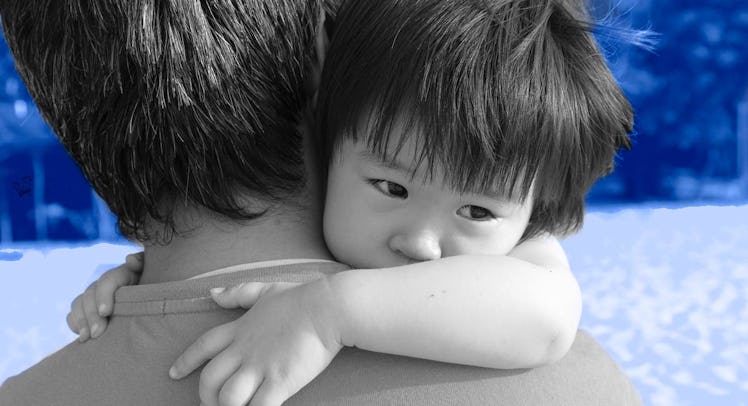The 22 Best Expert Parenting Tips On Comforting Children
Here's what researchers, scientists, and experts recommend for comforting kids.

Comforting children means addressing deep fears as well as avoiding sources of continued anxiety. This is complicated by the fact that children often struggle to understand what frightens or scares them. Comforting children, especially young kids and toddlers, should always be about helping them recognize that something isn’t a threat like they thought it was, but it’s also important to take the upset seriously even when it comes from a place of illogic (and not laugh at the idea a stuffed bear might attack someone). Striking a balance of information and acknowledgment can be tough, but it’s the best way to empower a kid to overcome negative feelings. Parents can acknowledge when things like weather seem scary while acknowledging the difference between pertinent and distant danger. Being there for them in a comforting way doesn’t just mean listening to them, it means talking them through the anxieties they have.
Here’s what researchers, scientists, and experts recommend for comforting kids.
Comfort Rule #1: Bad Weather is Harmless
- Turn off the news. Keep the footage turned off until kids are sound asleep. Or, at least keep it relegated to discreet phone checks when kids are around.
- Let them know there are safety contingencies that will help keep them safe, like emergency kits and plans on where to seek shelter in the home.
- Offer firm reassurance that you will keep them safe no matter what.
- Stay away from frightening words when describing weather events. Abstract words allow them to fill in the gaps of knowledge with frightening thoughts.
Comfort Rule #2: Nightmares are Avoidable
- Comfort your child when they have nightmares. Coddle them and reassure them everything is okay.
- Do not stay with the child until they fall back asleep, because you risk screwing up their sleep patterns.
- Avoid inappropriate movies, shows, games and the news, as they can all trigger nightmares for a child.
- Keep a consistent sleep schedule of good sleep for the kid, as sleep disturbances make a kid prone to nightmares.
- Create a faux “monster repellent” — a spray bottle full of water — and spray the closest and underneath the bed well before bedtime to calm their nerves.
Comfort Rule #3: Halloween Monsters aren’t Real
- Honor belief and to let children know everyone is afraid of something.
- Tell the kid what frightens you, say that you’re afraid of something, and then immediately explain that it isn’t real.
- Ask where the question is coming from in order to create a dialogue about the underlying fear.
- Give your children lots of opportunities for free and dramatic play as a way to work through their fears.
Comfort Rule #4: Death is Normal
- Treat death with solemnity and respect.
- Prepare for a pet’s death by exploring grief and talking about the possibility of a final end (not “going to sleep” or “to the farm upstate”). This discussion can help to normalize your child’s emotions when a pet eventually does pass away.
Comfort Rule #5: Scary Movies are Impactful
- Avoid saying “it’s fake”, as that doesn’t mean anything to kids. Children under 7-8 years old do not have the capacity to tell the difference between fantasy and reality.
- Be mindful of your kid’s fears and the media they’re watching. Get familiar with what freaks them out, and avoid it.
- Watch the film before your kid does, or at least watch a trailer, or read an IMDB synopsis before your kid watches the media. Keep in mind a G-rating doesn’t mean every film is perfect for every child.
- Refrain from taking your kid to the movie theater at first. Movies at home can be paused or stopped if it gets too extreme for your kid.
Comfort Rule #6: Conspiracy Theories aren’t Appropriate
- Beware of using conspiratorial words around your child. While they may not understand the actual words, they will start to clue in on your tone and behavior.
- Avoid telling or exposing your child to outlandish conspiracy theories. A child’s brain is still developing, and they will believe what a parent tell them.
- Teach them critical thinking skills, as it will protect them from manipulators who leverage conspiracies to instill fear and anger.
This article was originally published on